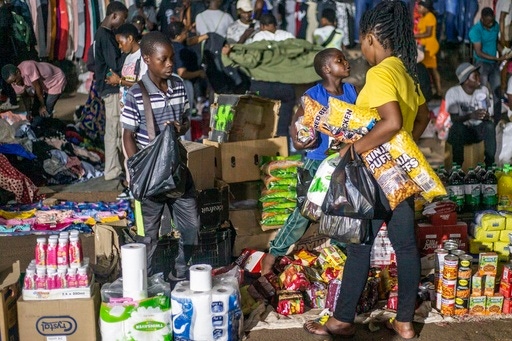Zimbabwe’s new currency woes hit traditional stores while illegal night bazaars flourish

People shop at informal and illegal markets that pop up at night to avoid police raids in central Harare, Zimbabwe, Friday, Nov. 11, 2024. (AP Photo/Aaron Ufumeli)[ASSOCIATED PRESS/Aaron Ufumeli]
HARARE, Zimbabwe (AP) — Batsirai Pabwe picked detergents, toothpaste, snacks and some pasta among several grocery items spread on the tarmac of a car parking space — an unorthodox night bazaar lit by cellphone flashlights and fluorescent lamps in Zimbabwe’s capital, Harare.
Traditional stores are struggling to survive as the volatility of Zimbabwe’s new currency pushes prices up. Many like Pabwe now shun them for much cheaper informal markets that pop up at night to avoid the glare of authorities.
From dusk, sidewalks, store or office verandahs and car parking spaces burst into unorthodox open air bazaars, offering anything from groceries to fresh meat, electronics, clothes, medicines, fashion accessories and stationery.
Unfettered by expenses such as rising energy costs, taxes and laws that force formal retailers to accept the local currency at artificially low official exchange rates, informal traders, including children, offer better bargains. A box of juice that sells for $3 in a supermarket costs half of that on the street.
“It’s my first time shopping here. My friend told me that it’s much cheaper than the supermarkets,” 30-year-old Pabwe said, visibly relieved as he filled up a plastic bag with items for just $20. “I decided to give it a try and I really enjoyed it.”
For the same amount in a supermarket a week ago, Pabwe said he only managed to get “meat and spices and they were not even that much.”
The once-prosperous southern African nation of 15 million people in April introduced a new gold-backed currency called ZiG, short for Zimbabwe Gold, to replace one that had been battered by depreciation and often outright rejection by the people.
It is the country’s sixth attempt at a new currency since the spectacular 2009 collapse of the Zimbabwe dollar and adoption of the U.S. dollar as legal tender amid hyperinflation of 5 billion percent, one of the world’s worst currency crashes to date. The U.S. dollar has since remained legal tender alongside successive local currencies.
The latest currency, the world’s newest, came with pomp and fanfare — promotional catchy jingles and songs played repeatedly on public radio, television and online.
Seven months on, the ZiG seems to be tanking, like its predecessors. The gap between official and black market exchange rates continues to widen, with many people and informal traders who dominate the economy again preferring the more stable dollar.
Traditional stores, forced by authorities to charge using the local currency, are increasing prices to make ends meet. But they have also become uncompetitive against unregulated informal markets, the Retailers Association of Zimbabwe, an industry representative group, said in September.
It warned of store closures, saying the situation is “clearly untenable.”
In October, Pick n Pay, one of Africa’s biggest grocery chains that operates more than 70 stores jointly with a local partner in Zimbabwe, said that it had ‘impaired” its investment in Zimbabwe “to a book value of zero” because of the “deteriorating economic conditions.”
“In every transaction business is doing in the formal setup, it’s making an exchange rate loss that cannot be compensated. The major issue here is a currency crisis,” said Gift Mugano, an economics professor. Huge overheads worsen the retailers’ situation.
“Everything is against their survival. The informal sector works at night, (if there is) no electricity they use their phones, they don’t care. They are there for survival,” Mugano said.
The contrast is palpable in Harare’s Central Business District, where only a few shoppers solemnly scanned prices in a supermarket on a recent day.
Soothing music played from speakers inside but was drowned out by the buzz created outside by hordes of street vendors shouting out bargains to a sea of shoppers.
“Business is booming,” said Oswald Gari, a vendor, adding that he only works at night when the police leave.
Gari, 51, said he’s fending for his six children and four nephews under his care from the night trade. He harbors no hope of finding formal employment in a country where once roaring industrial sites are being turned into giant warehouses for imported goods, many which end up on the streets, and rail tracks are now overgrown with weeds.
More than 80% of Zimbabwe’s employable population ekes out a living in the informal sector, according to official figures and the International Labor Organization.
For Pabwe, shopping from the informal night markets means less headaches.
“It’s quite confusing, especially for people like me who really don’t understand the value of the ZiG. I always get confused when I get into supermarkets,” he said.
He was satisfied with his shopping at night bazaar.
“I got everything I was looking for and the pricing is really affordable. I actually managed to buy a handful for just $20. I even got my washing powder and dishwashing liquid,” he said. “I think I will do this more often.”
Copyright 2024 The Associated Press. All rights reserved. This material may not be published, broadcast, rewritten or redistributed without permission.
